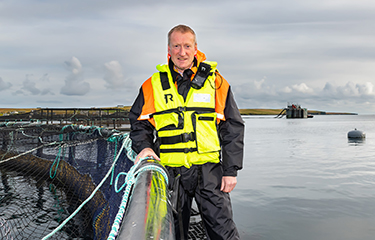Op-ed: Scotland’s axing of HPMA plan provides opportunity for more inclusive approach

Tavish Scott is chief executive of Salmon Scotland, a trade group representing Scotland’s salmon-farming sector.
With the Scottish government ditching its highly protected marine areas (HPMAs) plans, it’s high time we took stock and ensured that the voices of coastal communities are given due consideration.
By axing the proposal, a golden opportunity arises for a more inclusive and evidence-based approach to safeguarding our seas, while addressing the concerns of the seafood sector, marine businesses, local authorities, and coastal communities.
For too long, many across the Highlands and islands have felt that the government is indifferent to the struggles of rural life. The idea of HPMAs, championed by the anti-growth Scottish Green Party, has raised legitimate concerns, leading to doubts about whether narrow political motives are being given priority over science and the promotion of sustainable progress.
Fortunately, mounting opposition from local authorities, fisheries, aquaculture, and even within the SNP's own ranks has compelled the government to reverse its stance. Few will forget the sight of former minister Fergus Ewing ripping up the plan at Holyrood, describing it as a “notice of execution” for the seafood sector. At Salmon Scotland, we have shared these serious concerns regarding the detrimental effects of HPMAs on people's lives and livelihoods.
We know that in large parts of Scotland, the salmon farm at the end of the lane and the people it employs are what keep local schools and shops open. We are part of a global success story that now delivers a whopping GBP 760 million (USD 876.1 million, EUR 883.2 million) boost for the Scottish economy. That includes a direct economic contribution of GBP 303 million (USD 396 million, EUR 353 million) in gross value added (GVA), up nearly a fifth on pre-pandemic levels, with the supply chain further supporting 10,000 jobs in every part of Scotland.
Under the Bute House Agreement with the Scottish Greens, there was a possibility of designating 10 percent of Scotland’s coastal waters off-limits to human activities. There was a significant risk of job losses in some of our most fragile coastal communities, undermining the Scottish government's own blue economy approach that supports sustainable economic growth.
If the government were to prohibit the development of salmon farms in their customary consented areas or compel salmon farmers to relocate, it would further diminish our market share and global competitiveness. Such actions could lead to a loss of business confidence in Scotland, with a shift of focus towards our Scandinavian competitors. Consequently, Scotland would miss out on valuable, well-paid employment opportunities and essential investments, particularly when they are most needed.
The fact that there was no scientific justification for the proposals or evidence only adds insult to injury. Moreover, it remains unclear what would happen if the Scottish government couldn’t obtain the necessary powers from Westminster to extend the zones beyond 12 nautical miles from the shore. This could have resulted in the ban covering up to half of the country's coastline if limited to a smaller portion of territorial waters.
Scottish salmon, from the cold waters off our west coast and outer islands, is rightly recognized as the best in the world. We support proposals that can improve Scotland's marine environment, but banning responsible sea use was never the answer. One in three salmon farms already operate responsibly in marine protected areas (MPAs), which cover 37 pe cent of Scottish waters. Many of these MPAs were designated after the farms had already been established in the area.
As Scotland Net Zero Secretary Mairi McAllan embarks on another round of consultations and a planned summer tour of Scotland's coastal communities, it is imperative that we find a balanced approach that does not leave the sword of Damocles hanging over their heads. It is crucial that she listens to those who are directly impacted by these decisions and work together to find practical and sustainable solutions.
We have shown that HMPAs were ill-advised, ill-considered, and ill-judged. Moving forward, the Edinburgh administration must base its decisions on evidence, science, and facts – not perception, politics, and pandering to campaign groups that are funded to attack the sector.
We need to do everything we can to support sustainable business growth, rather than erecting unnecessary barriers that will only result in economic decline. Hopefully, ministers have now recognized the dangers and remain on course, without causing unnecessary harm to the very communities they aim to protect.
Photo courtesy of Salmon Scotland




Share